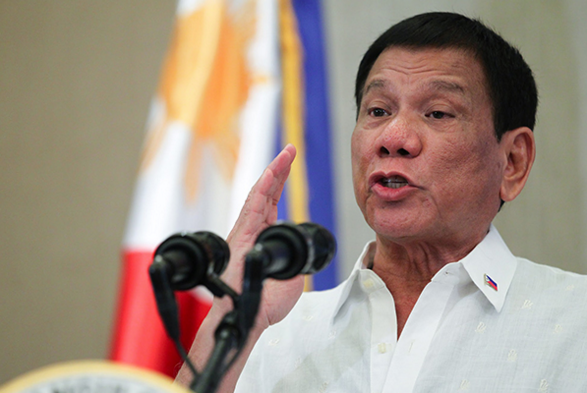MANILA – President Rodrigo Duterte will definitely heed Congress and the SC as collegial bodies when they carry out their constitutional mandates; what Duterte had said he would ignore are individual reactions of members of these bodies, Justice Secretary Vitaliano Aguirre II said Monday.
Duterte was taken out of context by critics for his remarks late Sunday that he would defy Congress and the Supreme Court with regard to decisions on martial law, according to the DOJ chief.
“Article VII, Section 18 of the Constitution [says] Congress can revoke? Kaya nga ang gusto ni President, ang ibig sabihin ng President, yung opinions ninyo ngayon – not the action of Congress as a body, presently ha – di ko pakikinggan kayo kasi ang dami dami, may mga senador, may mga congressman, na [nagsasabing] ang declaration ng martial law ay illegal or not in accordance with the Constitution. Sa ngayon sabi ni presidente di ko kayo pakikinggan because I am the recipient of the information which you are not privy [to]. He is referring to the individual reaction of these people.”
“[What the President is saying, what he means, is that he will ignore your individual reactions now – not Congress as a body. He won’t listen to you right now because there are many congressmen and senators saying martial law is illegal or not in accordance with the Constitution. He is saying he won’t listen to people who are not privy now to information that he as President is privy to.].”
In Cabinet meetings, said Aguirre, the President said nothing about setting aside any decision of Congress or SC.
If the President meant to ignore Congress, said Aguirre, he would not have brought along with him the Senate President and House Speaker to get their opinions on martial law.
In the view of Aguirre, the House and Senate should convene in joint session.
Constitutional crisis?
Meanwhile, the DOJ chief fretted over the possibility of a constitutional crisis in case the Supreme Court overturns martial law.
Aguirre said the SC is actually “powerless” once Congress affirms the President’s martial law declaration.
“For example, Congress says the President is right in his declaration – the Congress in joint session together with the Senate, that is their voice – and then the declaration of the President for 60 days is valid, according to Congress. But in the same period, the SC has 30 days within which to resolve all petitions against the declaration of martial law on the basis that it is not in accordance with the acts,” Aguirre said, speaking partly in Filipino.
So, if “Congress has already resolved or determined the proclamation is valid,” Aguirre added that, “in my opinion, the SC is almost powerless to override the declaration of Congress and the President. Why? Because if Congress says the declaration is improper and thus the declaration of martial is revoked, nobody can overturn that revocation, not even the SC.” By the same token, he said, Congress can affirm the declaration and “so, ibig sabihin nun, kapag nag-affirm ang Congress di mo ma- overturn ‘yan, not even the SC [that means that if Congress affirms it, you cannot overturn it, not even the SC].”
The only ground for SC to overturn martial law despite Congress’ affirmation is if the SC determines that there is no basis for the declaration, Aguirre said.
The SC, under the Constitution, has 30 days to review the declaration of martial law.
Under the law, said Aguirre, “the only way that the Supreme Court could annul the declaration of martial law by the President, and if it is concurred in by Congress, [is] if it is shown that the President had acted arbitrarily. Arbitrary means there is no basis.”
The Constitution provides for the annulment “when the SC or any petition in the SC will show that the action of the President is arbitrary,” and proving the arbitrariness –or totally devoid of basis is rather difficult, said the DOJ chief.
In the case of Marawi, Aguirre said, it is hard to prove there is no basis because everyone has seen the kind of lawlessness and murderous rampage of the Maute Group that is courting full ISIS recognition by setting up a wilayat or IS province in Mindanao.
He said the President’s letter to both houses of Congress, had underscored the atrocities and the act of raising the ISIS flag. “This is rebellion. They wanted [to remove] the allegiance of the people [from] the Philippine government and be given to the caliphate, which they are going to set up. They wanted Mindanao to be a province of ISIS, at least insofar as Marawi is concerned.”










